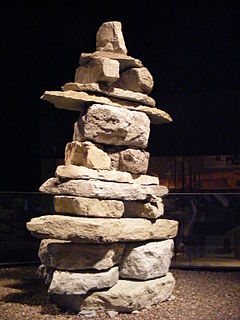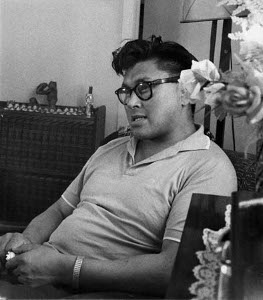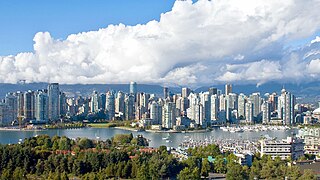Devolution is the statutory delegation of powers from the central government of a sovereign state to govern at a subnational level, such as a regional or local level. It is a form of administrative decentralization. Devolved territories have the power to make legislation relevant to the area.

The Legislative Assembly of the Northwest Territories, or Legislative Council of the Northwest Territories, is the legislature and the seat of government of Northwest Territories in Canada. It is a unicameral elected body that creates and amends law in the Northwest Territories. Permanently located in Yellowknife since 1993, the assembly was founded in 1870 and became active in 1872 with the first appointments from the Government of Canada.

Peter Taqtu Irniq is an Inuk politician in Canada, who served as the second Commissioner of Nunavut from April 2000 to April 2005.

Elections in Zambia take place within the framework of a multi-party democracy and a presidential system. The President and National Assembly are simultaneously elected for five-year terms.
The Northwest Territories general election of 1888 was the first general election in the history of the Northwest Territories, Canada. Elections were held in various districts between 20 June and 30 June 1888. This was the only general election, where the writs were issued to return on various days.

The 1st Council of the North-West Territories also known as the North-West Council in Canada lasted from October 7, 1876, to 1888. It was created as a permanent replacement to the Temporary North-West Council which existed prior to 1876 and was replaced by the 1st North-West assembly when the quota of elected members was reached. The numerical denomination 1st was applied when the 2nd Council of the Northwest Territories was created to differentiate between the two councils.

The history of Northwest Territories capital cities begins with the purchase of the Territories by Canada from the Hudson's Bay Company in 1869, and includes a varied and often difficult evolution. Northwest Territories is unique amongst the other provinces and territories of Canada in that it has had seven capital cities in its history. The territory has changed the seat of government for numerous reasons, including civil conflict, development of infrastructure, and a history of significant revisions to its territorial boundaries.
Lorne was an electoral district that existed in the District of Saskatchewan, Northwest Territories from 1880 until 1888. The district was one of the first three electoral districts in the Territories. It was created by statutory proclamation in 1880. Of the three electoral districts proclaimed, it was the only one to actually have an election held in it.
The 2nd Council of the Northwest Territories, known formally as the Council of the Northwest Territories, was the governing body of Canada's Northwest Territories from 1905 to 1951. In 1905 when Alberta and Saskatchewan were carved out the Northwest Territories, the remaining population was too small to legally hold elections. The Northwest Territories reverted to 1870 constitutional status. Political parties and the position of Lieutenant Governor was abolished. The government came under the direct control of Ottawa.

Nellie Cournoyea is a Canadian politician, who served as the sixth Premier of the Northwest Territories from 1991 to 1995. She was the first female premier of a Canadian territory and the second female premier in Canadian history after Rita Johnston of British Columbia.
Lena Pedersen or Lena Pederson is a politician and social worker from Nunavut, Canada. In 1959, she moved from Greenland to the Northwest Territories and lived in Coppermine (Kugluktuk), Pangnirtung and Rae (Behchoko) before moving to Cape Dorset where she participated in the artwork sales of the West Baffin Eskimo Co-operative.
The 1st Northwest Territories Legislative Council was the 8th assembly of the territorial government lasting from the election on September 17, 1951 to dissolution in 1954. This council would see elected members returned it for the first time since 1905.
The 5th Northwest Territories Legislative Council was the 12th assembly of the territorial government. This council's members were elected and appointed in the 1964 general election and served until it was dissolved for the 1967 general election
Mark Evaloarjuk, CM was a northern Canadian business pioneer and politician. He served as a member of the Northwest Territories Legislature from 1975 until 1983, and served as President of Arctic Cooperatives Ltd. In 1981, he became inducted as member of the Order of Canada.
Kelvin Ng is a former territorial and municipal level politician in Canada who was elected in both the Nunavut Legislature and Northwest Territories Legislature.
Thomas H. "Tom" Butters, was a politician from Northwest Territories, Canada. He had a long career as a Member of the Northwest Territories Legislature from 1970 until 1991.
Lorne Kusugak is a Canadian politician, who is Member of the Legislative Assembly of Nunavut for the electoral district of Rankin Inlet South. Prior to becoming an MLA, Kusugak was the mayor of Rankin Inlet. Kusugak served as the Nunavut Minister for Community and Government Services, Minister for Energy and the Minister responsible for the Qulliq Energy Corporation.

The British Virgin Islands general election, 1963 was a general election held in the British Virgin Islands on 28 November 1963 for seats on the Legislative Council of the British Virgin Islands.











